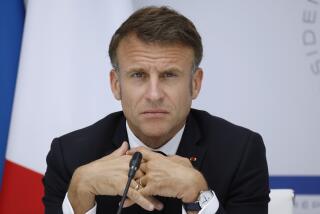EU Will Ease Deficit Limits to Spur Growth
- Share via
European Union finance ministers bowed to German pressure to ease limits on government borrowing, seeking to boost an economy that has lagged behind the U.S. for 12 of the last 13 years.
Finance chiefs agreed to let the 12 countries using the euro surpass the deficit ceiling of 3% of gross domestic product when growth is sluggish or “relevant factors” such as Germany’s costs for rebuilding its ex-communist East force up spending.
“What we’re suffering from in Europe is a growth problem,” German Finance Minister Hans Eichel said at a news conference after the agreement late Saturday in Brussels. “The pact is now more rational and more growth-friendly.”
The relaxation of the rules may trigger a conflict with the European Central Bank, which warned last week that it might have to raise interest rates to prevent swelling deficits from fueling inflation.
Europe’s growth stagnated at 0.2% in the fourth quarter, trailing the U.S. rate of 0.9%. Germany and Italy, which account for half the region’s $10-trillion economy, contracted.
Europe has outpaced the U.S. only once since 1991.
That was in 2001, when the euro region expanded 1.6% and the Sept. 11 attacks helped reduce U.S. growth to 0.8%, according to EU figures.
Subpar growth has kept Germany and France over the deficit bar since 2002. Figures showing Italy at the limit in 2004 may be revised higher, the EU statistics office said last week. Greece posted a 6.1% deficit in 2004, the highest of any country in the currency’s six-year life.
Dominating the debate was Germany’s demand that the EU acknowledge the costs of subsidizing the eastern states after reunification in 1990 as the leading strain on its public finances.
To meet that demand, the EU decided that spending on the “unification of Europe” could be used to excuse excessive deficits “if it has a detrimental effect on the growth and the fiscal burden of a member state.”
French Finance Minister Thierry Breton said the European unity clause wouldn’t apply to Germany alone, saying “everybody can use it if it’s appropriate.”
France also got its wish of seeing spending on research and development taken into account.
Poland, the largest of the 10 countries that joined the EU last year, won a pledge that the costs of switching to a partially privately financed pension system would be taken into account when the EU passed judgment on national budgets.
EU government leaders will ratify the accord at a Brussels summit Tuesday and Wednesday and give the European Commission, the EU’s executive agency, the job of rewriting the legal texts that make up the stability pact.
The decision to tinker with the legislation is a blow to ECB President Jean-Claude Trichet, who last week told a European Parliament committee that “whatever happens the ECB, according to its own mandate, will deliver price stability.”
The accord is “not my best solution,” said Austrian Finance Minister Karl-Heinz Grasser, and Finnish Finance Minister Antti Kalliomaki voiced regret.
The central bank has kept its main rate at a six-decade low of 2% for 22 months. Inflation was 2.1% in February, topping the ECB’s 2% target for the ninth time in 10 months.
More to Read
Inside the business of entertainment
The Wide Shot brings you news, analysis and insights on everything from streaming wars to production — and what it all means for the future.
You may occasionally receive promotional content from the Los Angeles Times.









